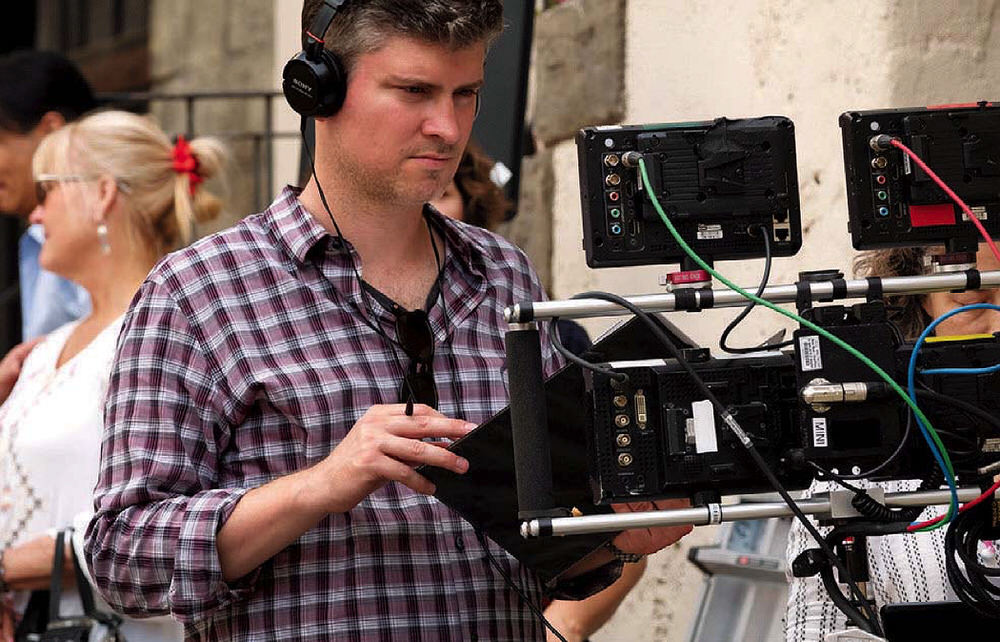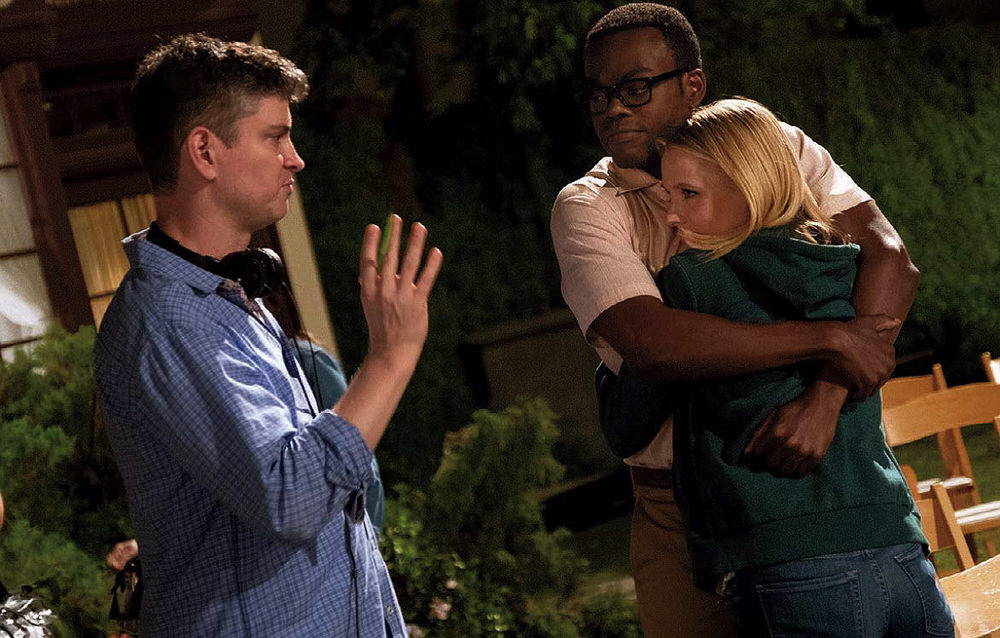Mike Schur ’97 just loves philosophy. He favors Aristotle, but will also turn to utilitarianism, Kant, ubuntu, and existentialism. “I take a jambalaya approach,” he says. “I don’t know why anyone would decline any school of thought if it has something good to teach you.”
This is not a typical conversation in the world of sitcoms, an arena where Schur’s track record is hard to top: he was an executive producer on The Office, then co-created Parks and Recreation and Brooklyn Nine-Nine, created The Good Place and, most recently, co-created Rutherford Falls.
“Mike is unapologetically earnest and seeks ways to present how difficult the world is but also how the world should be—without making it feel like homework,” says Rutherford Falls co-creator and showrunner Sierra Teller Ornelas. “He’s also really silly and very funny. He can go from deep discussions about philosophers whose names I can’t pronounce right into vomit jokes”—all as part of a show about a small town and a growing cultural and political conflict between white and Native American communities. (She also praises Schur as a “true ally” to the show’s Native American writers.)

Mike Schur on set of the Good Place
Photograph by Colleen Hayes/NBC
While Schur, 46, who lives in Los Angeles with his wife, the screenwriter J.J. Philbin, and their children, was seemingly born thoughtful, he didn’t always obsess over moral dilemmas. At Harvard, where he concentrated in English, he took a course on pre-Socratic Greek philosophy and another on moral reasoning as part of a plan to “take the least practical courses, making my selections based one hundred percent on what seemed fun” before heading into the real world. (He was also president of the Lampoon.) It was only as he turned 40 and started The Good Place that he dove deeply into philosophy and ethics.
The show featured four characters who died after living less-than-exemplary lives. To earn their spot in the “Good Place” (heaven), they needed to become better people, sparking discussions and debates about ethics and morality. But the show was also quite silly. It earned acclaim for generating belly laughs while exploring heady topics, and when it ended, Schur’s fascination with philosophy and ethics had only grown. So he wrote a book, his first, How to Be Perfect: The Correct Answer to Every Moral Question, just published this January. It features plenty of humor—including riffs on everything from Hawaiian pizza to the extreme Britishness of philosopher Bertrand Russell—but tilts the balance toward a serious examination of what it takes to live the good life. Writing the book was a unique challenge for a man who has spent his career buttressed by staffs in writers’ rooms. “Being alone was scary, man,” Schur says. “I enjoyed the challenge, but it was a lot less fun than being in a room of funny people.”

with stars Kristen Bell and William Jackson
Photograph by Colleen Hayes/NBC
While the laughs always took precedence on The Good Place, for the book Schur had to rein himself in. “The revision process was mostly me restraining my instinct to add jokes,” he says. “I used the footnotes to be funny.”
The chapters examine different schools of philosophical thought and move into progressively harder moral dilemmas, such as whether it’s possible to enjoy great art made by terrible people and what reasons there are to be good when there are no consequences for being bad. “It’s about how the choices we make affect other people and how we’re required to make choices or sacrifices on a daily basis,” Schur says of the book.
Even before his philosophy plunge, Schur brought a distinctively humane approach to the TV worlds he built, says Parks & Rec co-star Nick Offerman. “He pushes big values and has always had an adult sensibility and a sense of responsibility even when embroidering his shows with extreme silliness.” (Offerman also delights in reminding people that Schur, this exceedingly introspective and grounded man, played Dwight Schrute’s outlandishly bizarre cousin Mose on The Office.)
Brooklyn Nine-Nine star Andy Samberg adds that Schur brings the same sensibility to working relationships. “Mike is unique in a business that can be pretty intense and cutthroat,” he says, “because he’s genuinely committed to kindness and thoughtfulness and fairness.”
Schur’s approach to life and to comedy can best be described as anti-Ayn Rand—he torches Rand’s writing and thinking in his book. He’s not a scold, but a warm, chatty conversationalist who is a good listener even when he’s the interview subject. Still, he can be provoked into a rant (albeit a calm and soft-spoken one) by being asked about Rand’s “I, me, mine” outlook: “The question is, do you believe there should be a society or not?” he begins. “You can say, ‘There’s no such thing as community’ and ‘Life’s an I win, you lose zero sum game’—or you can say, ‘We’re all in this together and you need to voluntarily give up some percentage of your own unfettered ability and desire to do whatever the hell you want whenever you want for the betterment of the world you live in.’ We’re part of a team here and you can’t exist alone, so I just cannot get inside that mindset. I’ve really tried.”
Schur’s book attempts to demolish the notion that each of us is the star of our own movie, with the universe revolving around one’s own storyline and immediate happiness. He explores a range of ethical dilemmas, from the famous “trolley problem” (which confronts the question of whether to sacrifice one person to save multiple others, and which Schur brought to gross but hilarious life—and death—on The Good Place), to the moral impact of everyday decisions like jaywalking and making the extra effort to return a shopping cart to its intended place.
A born rule-follower, Schur’s reasoning now leads him to argue that in some cases—like jaywalking or rooting for a sports team whose owner or players don’t align with your moral code—breaking rules may sometimes be practical, necessary to make it through the day, and even morally acceptable. (Raised in Connecticut, Schur’s fandom includes the Celtics, Red Sox, and Patriots, who, Schur concedes, do not have an impeccable track record, morally speaking.)
How to Be Perfect doesn’t argue for perfection but for constant reflection and striving for improvement. That can be overwhelming—Schur favors the phrase “moral exhaustion” because “we’re all tired and have responsibilities and these are a lot of decisions to make”—but he believes it’s worth the effort. “We have to break out of the grooves in our behavior,” he says. “Aristotle warned that we have to always question what we’re doing and whether it’s good enough….I want to be searching and probing all the time, as hard and annoying as that is.”









